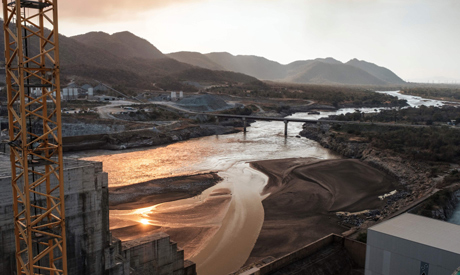
File photo: taken on December 26, 2019, a general view of the Blue Nile river as it passes through the Grand Ethiopian Renaissance Dam (GERD), near Guba in Ethiopia. (AFP)
Egypt said on Friday it rejected a proposal by Ethiopia to delay a decision on "points of contention" in the current negotiations on the disputed Grand Ethiopian Renaissance Dam (GERD) until after an agreement is reached.
In an official statement, Egypt’s irrigation and water resources ministry said AU-brokered talks on the filling and operation of the dam continued for the eighth day in an attempt to converge views on points of disagreement in the attendance of observers from the US and EU.
The statement said Egypt refused a suggestion by Ethiopia to postpone a decision on contentious points in the talks until an accord is signed and a technical committee is formed to follow up with the implementation of the accord's provisions.
“Such points of disagreement that touch upon Egyptian concerns in key technical issues cannot be deferred to the technical committee later after the signing of the agreement,” the statement added.
The statement noted that Egypt has proposed several draft agreements for the convergence of views on procedures to deal with extended drought and rules of annual operation and refilling.
Ethiopia said it will review alternatives proposed by Egypt, with a tripartite ministerial meeting set to be held on 12 July to discuss the proposals, according to the Egyptian statement.
No consensus was reached over points of disagreement during discussions by the legal committee seeing the participation of the three countries, it added.
The talks, which have not resulted in any breakthrough in the crisis, come as Ethiopia remains adamant to start filling the GERD reservoir this month to take advantage of the current heavy rain season, regardless of whether or not an agreement is reached with Egypt and Sudan.
The two downstream countries have repeatedly called on Ethiopia not to take any unilateral action concerning the filling of the dam.
Egypt, which relies on the Nile for 95 percent of its fresh water, fears the dam will significantly reduce the river’s flow, especially during the filling stages through periods of drought, extended drought and dry years. Ethiopia, on the other hand, says the project is key to its development.
Short link: